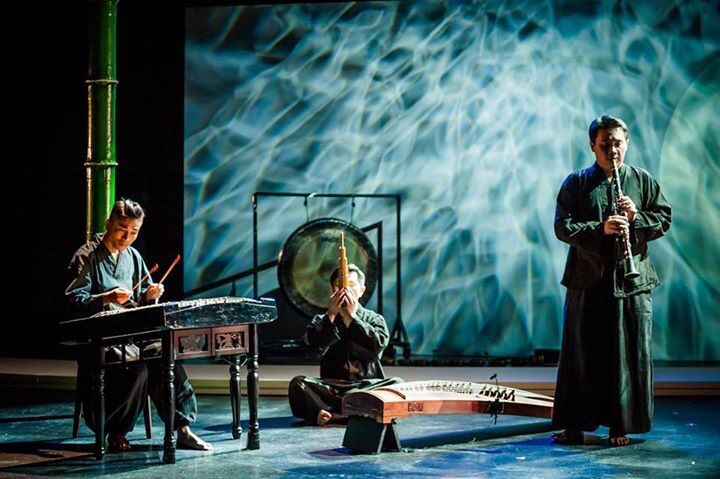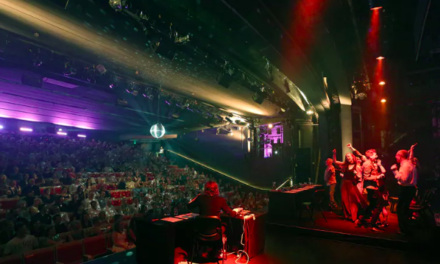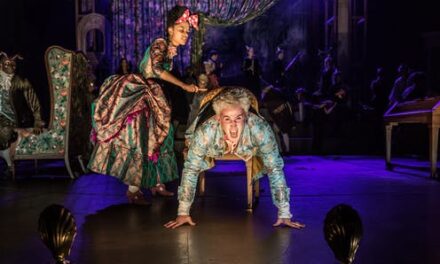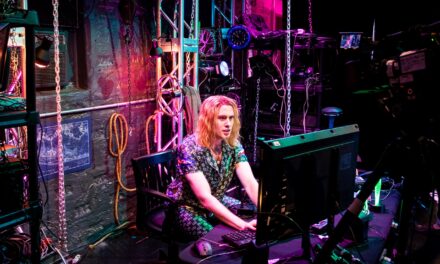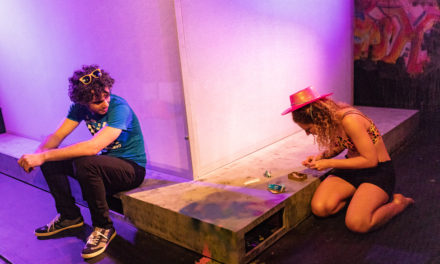Readers who are familiar with Hong Kong’s New Wave cinema would not be strangers to Hong Kong composer Law Wing-fai’s award-winning work, such as the soundtracks of Ann Hui’s Boat People and A Simple Life, as well as of Tony Au’s Dream Lover. With Beyond the Senses (Yi se yi xiang; 一色一香), Law takes a creative excursion and seeks to develop a hybrid form of production that he intriguingly refers to as “atmospheric music theatre”, which cultivates a space of reflection through “Oriental aesthetics” — as stated in the production’s house programme.
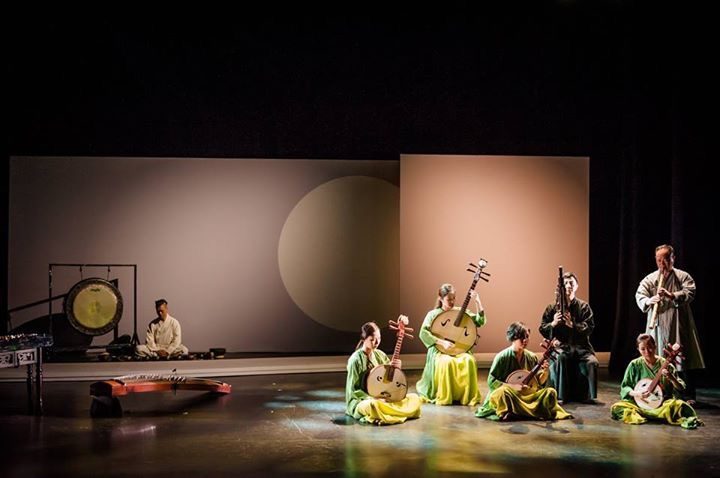
Beyond the Senses – Atmospheric Music Theatre by Law Wing-fai. Photo courtesy Wuji Ensemble/RhapsoArts Management
The Chinese title of the production alludes to the Buddhist notion of “Yi se yi xiang, wu fei zhong dao” (一色一香,無非中道), which means to attain realisation through our surrounding objects. In Beyond the Senses, these objects of realisation are the stage setting and a series of genre-transcending performances. Classical Chinese poetry such as Su Shi’s “Water Dragon Chant” (Shuilong yin) , Zhang Xiaoxiang’s “On the Lake Dong Ting to the tune of Remembering Your Charm” (Nian Nujiao, Guo dongting), and excerpts from Tu Sikong’s “On Poetry” (Shi pin) are beautifully delivered in Kong Aiping’s Chinese kunqu (a.k.a. kunju; Kun Opera) vocals, and in Margaret Yim’s Western operatic soprano vocals. Particular highlights are Kong’s hand gestures and body movement, which seem to possess the uncanny ability to pause time with each precise move.
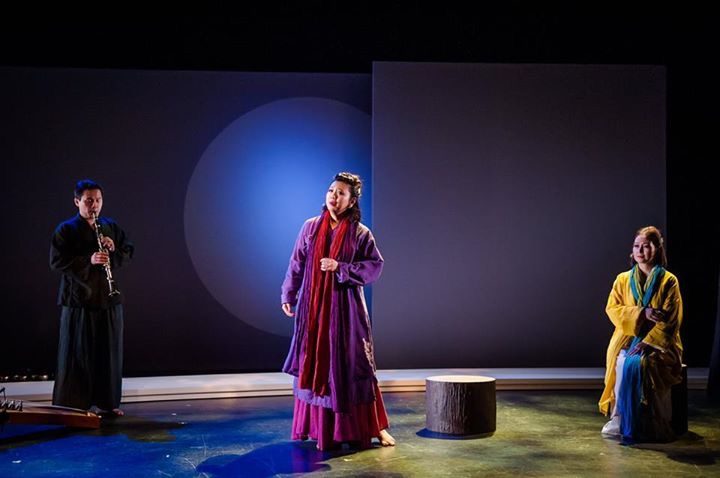
Margaret Yim (centre) and Kong Aiping (right) in Beyond the Senses – Atmospheric Music Theatre by Law Wing-fai. Photo courtesy Wuji Ensemble/RhapsoArts Management
There is a substantial amount of ensemble performances featuring a variety Chinese instruments (erhu, dizi, sheng, ruan, pipa, yangqin) and the less common Tibetan singing bowls. The second section of the production further attempts a cross-cultural dialogue with the inclusion of clarinet and Japanese Shō. All the musicians are masterful at their instruments, and successfully bring Law’s ensemble pieces to life. The above performances take place on a largely minimalistic stage: a lonely bamboo pole is situated at one side; the backdrop is a large full moon that occasionally changes colors; a white pathway spreads across the stage. The stage design effectively conveys the unmistakable essence of the Chinese garden (yuanlin).
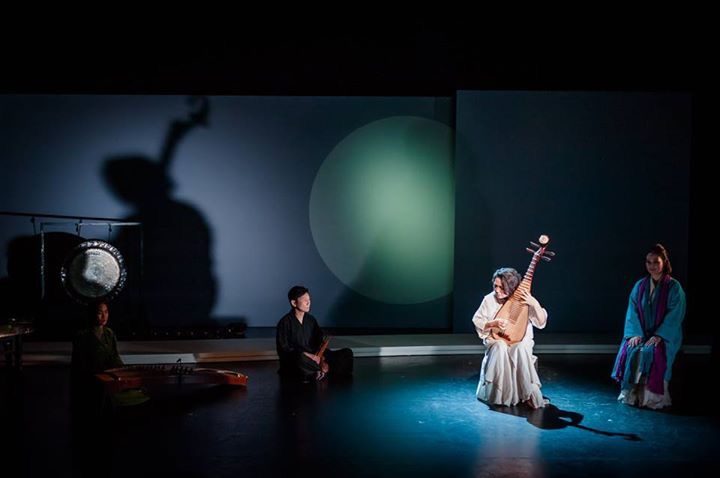
Beyond the Senses – Atmospheric Music Theatre by Law Wing-fai. Photo courtesy Wuji Ensemble/RhapsoArts Management
Each element of Law’s “atmospheric music theatre” offers an enjoyable and memorable experience when appreciated individually. However, when these elements come together in Beyond the Senses, the overall results are mixed. The pace of the production is slow, perhaps to achieve an atmospheric mood for reflection and meditation. Yet, regrettably, the outstanding performances and various scenes that unfold on the stage become distractions, and even disruptions, to the tranquil mood that the production sets out to achieve. While abstraction is certainly an intended aim of Beyond the Senses, the juxtaposition of Chinese poetry, singing, dance, and visual elements seem to lack a sense of coherence, which would allow the above elements to complement each other. Instead, the outcome veers towards Oriental pastiche, rather than “Oriental aesthetics”. Perhaps most disappointing is the misbalance of music and theatre in Beyond the Senses. At times, I wished Kong Aiping would play a more pivotal role in the production so that her performance could offer a theatrical center for the other performances to revolve around.
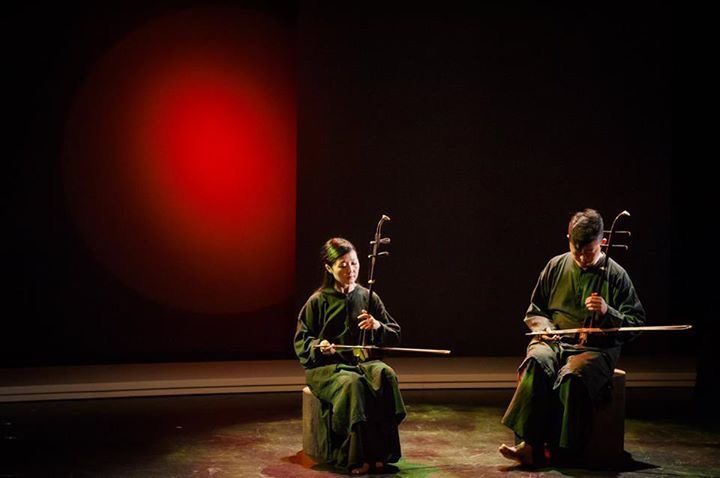
Beyond the Senses – Atmospheric Music Theatre by Law Wing-fai. Photo courtesy Wuji Ensemble/RhapsoArts Management
Beyond the Senses toured London as part of a showcase of Hong Kong’s “diverse musical landscape” in the 20th year of the establishment of the HKSAR. The production is certainly diverse, but leaves audiences who seek to go “beyond the senses” — particularly during such turbulent times in Hong Kong — something to be desired.
Michael Ka Chi Cheuk is a Ph.D. student in Chinese Languages and Cultures at SOAS University of London
This post was written by the author in their personal capacity.The opinions expressed in this article are the author’s own and do not reflect the view of The Theatre Times, their staff or collaborators.
This post was written by Michael Ka Chi Cheuk.
The views expressed here belong to the author and do not necessarily reflect our views and opinions.

